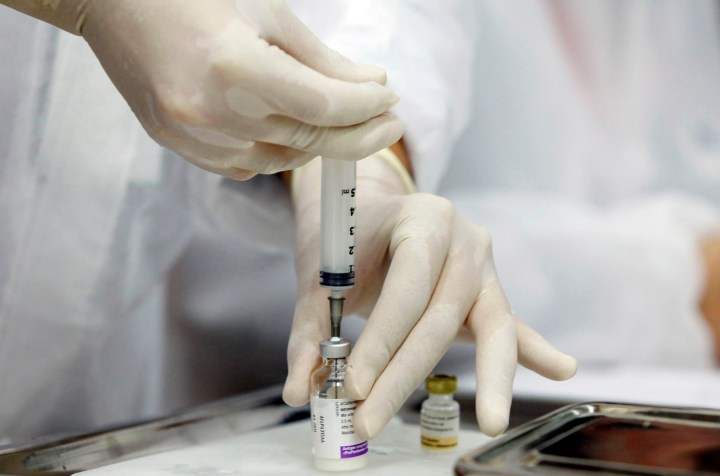Multimedia, Politics, Sci-Tech
The great global swine flu swindle

Two separate, but equally damning reports published in Europe, show the World Health Organisation may have created unnecessary panic about swine flu, and wasted vast sums of public money by declaring a pandemic, driving governments to stockpile drugs.
This seems to have happened while failing to disclose that the scientists who drafted WHO’s drug stockpiling guidelines had been on the payroll of huge pharmaceutical companies – setting it up to face a credibility crisis dubbed “the greatest medical scandal of the century”.
An investigative report by the British Medical Journal has revealed that “key scientists advising the World Health Organisation on planning for an influenza pandemic had done paid work for pharmaceutical firms that stood to gain from the guidance they were preparing”. The BMJ says WHO neglected to make these conflicts public and the UN’s health organisation fudged criticism and questions about its handling of the swine flu “pandemic” labelling these as little more than “conspiracy theories”.
The BMJ investigation reveals that the WHO’s guidelines for stockpiling swine flu drugs were drafted by a trio of scientists who had worked for and received payment from Roche and GlaxoSmithKline. The three had lectured, done consulting work or received sponsorship from Roche and GSK. WHO failed to make any mention of this when it was advising governments to stockpile pharmaceutical drugs, despite the fact that the scientists declared their conflict of interests to WHO.
The BMJ asked whether the pharmaceutical companies that had invested some £2.8 billion to develop a swine flu vaccine had insiders inside an emergency committee that put pressure on the WHO to declare a pandemic. It was WHO’s declaration that there was a pandemic that led to governments flocking in droves to secure drug contracts with pharmaceutical companies.
Watch: H1N1 Flu Scandal Exposed by Channel 4 News
If that isn’t bad enough, another report, this time by the Parliamentary Assembly of the Council of Europe (Pace) revealed, “overwhelming evidence that the seriousness of the pandemic was vastly overrated by WHO”. The Pace report adds weight to the BMJ allegation that WHO’s advice to governments could have been tainted by pharmaceutical industry influence.
“Some of the outcomes of the pandemic, as illustrated in this report, have been dramatic: distortion of priorities of public health services all over Europe, waste of huge sums of public money, provocation of unjustified fear among Europeans, creation of health risks through vaccines and medications which might not have been sufficiently tested before being authorised in fast-track procedures, are all examples of these outcomes,” the Pace report reads.
The Guardian reports that on the advice of WHO, Britain geared up for some 65,000 deaths and signed contracts with pharmaceutical companies for drugs and vaccines to the tune of £1 billion. In the final analysis the UK experienced fewer than 500 deaths and health authorities have been left desperately trying to back out of drug contracts to recoup funds.
The pharmaceutical companies, on the other hand, are laughing all the way to the bank. London analysts say that greedy pharmaceutical companies could have banked as much as £4.8bn as global governments went into panic mode and started stockpiling vaccines and other drugs in an attempt to stave off what was thought to be an imminent global swine flu epidemic.
With governments counting the cost of this flawed advice and WHO desperately trying to save face, Pace’s Paul Flynn is calling the A/H1N1 crisis “a pandemic that never really was”.
“There is not much doubt that this was an exaggeration on stilts. They vastly over-stated the danger on bad science and the national governments were in a position where they had to take action,” said Flynn. “In Britain, we have spent at least £1 billion on preparations, to the detriment of other parts of the health system. The tentacles of drug company influence are in all levels in the decision-making process. This is a monumental failure on the WHO’s part.”
The most dangerous aspect of this story is the “cry wolf” phenomenon. Given the battering WHO’s credibility has taken, will governments listen to the UN health organisation as readily next time – when there’s a real a global health crisis? Whether they do or not, there will be an exacting cost that once again will be borne by ordinary taxpaying citizens while pharmaceutical companies do what they do best – harvest ill-gotten profits.
By Mandy de Waal
Read the BMJ’s investigative report “Conflicts of Interest – WHO and the pandemic flu ‘conspiracies’.” Read the PACE report “The handling of the H1N1 pandemic: more transparency needed” Read Paul Flynn’s blog “Swine flu foul up”.
Main photo: A medical assistant prepares a H1N1 flu shot at the Health Ministry in Algiers December 29, 2009. Algeria starts a vaccination programme for workers considered most at risk on Wednesday. REUTERS/Louafi Larbi













 Become an Insider
Become an Insider